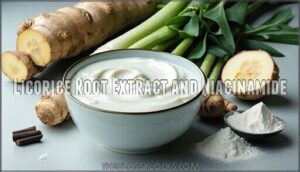This site is supported by our readers. We may earn a commission, at no cost to you, if you purchase through links.
 Using lemon juice for skin lightening can be effective but needs caution.
Using lemon juice for skin lightening can be effective but needs caution.
Its vitamin C reduces melanin, the pigment responsible for darker spots, and its natural acids gently exfoliate dead skin cells.
However, applying lemon juice directly can cause irritation, dryness, or even a reaction when exposed to sunlight (a condition called phytophotodermatitis).
Always dilute lemon juice with water and avoid using it on sensitive or broken skin.
And don’t forget sunscreen—UV rays can worsen skin damage.
Other options, like vitamin C serums or niacinamide, may be gentler and safer.
Curious about these alternatives?
Let’s explore what works best for you.
Table Of Contents
- Key Takeaways
- Lemon Juice Benefits
- Skin Lightening Risks
- Safe Application Methods
- Lemon Juice Alternatives
- Healthy Skin Lifestyle
- Frequently Asked Questions (FAQs)
- How long does it take to lighten skin with lemon?
- Is lemon juice good for skin whitening?
- What happens if I rub lemon on my face everyday?
- Can lemon juice lighten dark spots?
- How long does it take for lemon to lighten skin?
- What happens if I rub lemon on my face every day?
- Will lemon lighten dark spots?
- How long does lemon juice take to lighten skin?
- Can lemon juice remove dark spots permanently?
- Is lemon juice effective for body skin lightening?
- Conclusion
Key Takeaways
- Dilute lemon juice before applying it to your skin to avoid irritation, dryness, or chemical burns, and always use sunscreen afterward.
- Lemon juice can lighten dark spots temporarily with consistent use, but it’s not a permanent solution and takes about 2-4 weeks to show results.
- Avoid applying lemon juice daily, as it can strip natural oils, increase sun sensitivity, and harm your skin’s barrier over time.
- Safer alternatives like vitamin C serums, niacinamide, or licorice root extract offer skin-brightening benefits without the risks of acidity.
Lemon Juice Benefits
Lemon juice contains natural compounds like citric acid and vitamin C, known for their potential to brighten dark spots and even out skin tone.
Its gentle exfoliating properties can help shed dead skin cells, promoting a smoother, more radiant complexion.
Skin Lightening Properties
Lemon juice, rich in citric acid and vitamin C, has long been used as a natural hyperpigmentation treatment.
It works by reducing melanin production to lighten dark spots and uneven skin tone.
Traditional uses suggest noticeable results with consistent application over 2-4 weeks, making it an accessible, though temporary, skin lightening option for addressing discoloration.
Antioxidant Effects
Packed with vitamin C and flavonoids, lemon juice brings antioxidant benefits that combat free radicals, which can damage your skin over time.
By reducing oxidative stress, its ascorbic acid also preserves skin health and helps with skin lightening.
Plus, it supports collagen production, keeping your skin firm and youthful, and think of it as nature’s boost for a radiant look!
Exfoliation and Cell Turnover
It’s amazing how natural ingredients like citric acid and malic acid in lemon juice act as AHAs, gently exfoliating your skin and promoting cell turnover.
Regular use, with a smart exfoliation frequency, removes dead cells, encouraging fresh ones to shine through.
These AHA mechanisms keep your skin looking renewed, but don’t overdo it—balance is key to avoid irritation.
Skin Lightening Risks
Using lemon juice on your skin can lead to serious risks like irritation, increased sensitivity, and even chemical burns if you’re not careful.
Its acidity and photosensitivity can cause more harm than good, especially when exposed to sunlight.
Phytophotodermatitis Risk
Ever applied a citrus splash before stepping outside? It’s dangerous—furanocoumarins and psoralens in lemon juice can react with UV exposure, leading to phytophotodermatitis.
This reaction is often triggered by furocoumarins interacting with UVA light.
Watch for:
- Painful skin burning and blistering
- Blister formation evolving into long-lasting dark spots
- Inflammatory reactions, sometimes severe
- Heightened sun sensitivity
Always shield your skin after using citrus. Prevention beats treating those long-term effects!
Skin Irritation and Redness
Using lemon juice on your skin isn’t always smooth sailing.
Its acidic reaction can worsen skin sensitivity, especially for those with sensitive skin.
Sunlight exposure increases the risk of redness or an inflammatory reaction.
Many individuals find that environmental factors worsen sensitive skin redness.
| Cause | Effect | Worsens With | Avoid By |
|---|---|---|---|
| Acidic Reaction | Skin Burning | Prolonged Use | Dilution |
| Sunlight Exposure | Redness | Direct UV Rays | Sunscreen |
| Sensitive Skin | Skin Irritation | Harsh Products | Testing First |
| Improper Prep | Inflammatory Reaction | Skipping Moisturizer | Proper Application |
Chemical Burns and Dryness
Lemon juice’s acidity can cause chemical burns, especially with prolonged exposure. It triggers dryness, irritation, and sometimes painful blisters. Sensitive skin faces higher burn severity and scarring potential.
To avoid risks, it is essential to follow certain guidelines.
- Dilute juice to lower acidity levels.
- Limit use to a few minutes.
- Never apply to broken skin.
- Always rinse thoroughly and apply moisturizer to prevent dryness and irritation, ensuring the skin remains protected and reducing the potential for scarring.
Safe Application Methods
To use lemon juice safely on your skin, it’s essential to dilute it with water and limit application time.
Following proper methods helps reduce irritation and protects your skin from potential harm.
Dilution and Preparation
How do you safely dilute lemon juice for skin lightening? Mix equal parts lemon juice and water to reduce its acidity, preventing skin burns.
Always fresh-squeeze lemons for better juice freshness. Use clean application tools like cotton balls for even coverage. Proper mixing guarantees appropriate product ratios.
Store diluted mixtures in airtight containers, refrigerating for later use. Test on a small area to avoid skin irritation.
| Step | Details |
|---|---|
| Dilution Ratios | Equal parts lemon juice and water |
| Juice Freshness | Use freshly squeezed lemon juice |
| Application Tools | Cotton balls or pads for even coverage |
| Storage Methods | Airtight container in the refrigerator |
| Patch Test | Test diluted mix on a small skin area |
Homemade Masks and Recipes
To mix things up in your lemon juice routine, try DIY skincare masks at home.
Here are simple ideas:
- Oat flour masks: Blend oat flour, lemon juice, and honey; leave for 15 minutes.
- Avocado hydration: Combine mashed avocado, honey, and lemon juice for 20 minutes.
- Brown sugar scrub: Gently exfoliate lips with lemon juice and brown sugar.
- Honey-lemon blend: Apply honey mixed with lemon juice for radiant skin.
For enhanced clarity, try a mask where lemon enhances skin.
Lemon Juice Alternatives
If lemon juice feels too harsh or risky for your skin, there are safer options that can help lighten dark spots.
Products like vitamin C serums, licorice root extract, and niacinamide offer gentle, effective solutions without the side effects of acidity.
Vitamin C Serums and Creams
If you’re looking to brighten skin or fade hyperpigmentation, vitamin C serums might be your golden ticket.
With stabilized formulations and balanced pH levels, these skin care products absorb effectively without the risks raw lemon juice poses.
Serum concentrations around 10–20% promote Vitamin C stability, promoting collagen and evening skin tone.
Look for products designed for safe, consistent cream absorption.
Some serums also offer antioxidant protection against UV damage.
Licorice Root Extract and Niacinamide
Licorice root and niacinamide are safer options for skin lightening.
Licorice root reduces melanin synthesis, while niacinamide prevents pigment transfer, together tackling hyperpigmentation effectively.
These natural lighteners brighten skin without irritation, offering noticeable results within weeks.
Combining them can enhance skin brightening and even skin tone.
You can find various licorice root products online.
Their gentle yet powerful properties make them ideal for addressing dark spots and uneven complexion.
Professional Treatments and Consultations
For stubborn dark spots, dermatologist recommendations can be a game changer.
Professional treatments like chemical peels or laser therapy effectively target pigmentation.
Prescription lighteners offer precision, while a skin consultation guarantees personalized solutions.
Treatment efficacy depends on your skin type and goals, so trust a dermatologist to guide you.
Professional skin treatments provide safety, expertise, and visible results.
Healthy Skin Lifestyle
To support skin lightening and overall skin health, you need to maintain good hydration, eat a balanced diet, and use sunscreen daily.
Getting enough sleep and managing stress also help your skin stay clear, protected, and resilient.
Hydration and Balanced Diet
Your skin thrives when you’re hydrated and eating a balanced diet.
Proper hydration supports skin elasticity and cellular health, while a diet rich in antioxidants, like vitamin C, boosts nutrient absorption.
This combination enhances overall skin hydration and promotes a glowing complexion.
Remember, healthy skin starts from within—what you drink and eat impacts your skin’s health more than you think.
Sleep and Stress Management
Good sleep and stress management aren’t just luxuries—they’re your skin’s repair crew working overtime.
Prioritize sleep quality for skin repair and mental health, fostering overall skin wellbeing.
Stress reduction aids a balanced lifestyle, minimizing breakouts and uneven tone.
A relaxed mind and healthy routine support your skin care goals, proving a refreshed mind equals glowing skin.
Sunscreen and UV Protection
Broad-spectrum sunscreen is your shield against UV rays and sun damage.
Apply it daily, even when it’s cloudy—UV exposure risks don’t take breaks. Go for safe sunscreen ingredients like zinc oxide or titanium dioxide.
Reapply every two hours, especially after sweating or swimming.
Protecting your skin from sun exposure helps prevent dark spots and keeps your glow intact. Consistent use also helps maintain your skin’s microbiome balance, which is crucial for overall skin health.
Frequently Asked Questions (FAQs)
How long does it take to lighten skin with lemon?
Lightening usually takes 2-4 weeks of regular application.
Lemon juice’s citric acid helps reduce melanin, but results vary by skin type.
Remember, it’s not permanent, and always use sunscreen to avoid extra sun sensitivity.
Is lemon juice good for skin whitening?
Lemon juice offers mild skin whitening effects due to its citric acid and vitamin C, which reduce melanin.
However, it’s not a magic fix.
Use sparingly and always dilute to avoid irritation or sun sensitivity.
What happens if I rub lemon on my face everyday?
Rubbing lemon daily on your face might feel invigorating, but it’s a risky habit.
Its acidity strips your skin’s oils, causing dryness, redness, or burns, especially if sunlight’s involved.
Your skin deserves better care!
Can lemon juice lighten dark spots?
Yes, it can, but don’t expect miracles overnight.
Lemon juice contains citric acid, which gently fades dark spots over time.
Always dilute it, limit use to a few times weekly, and protect against sunlight.
How long does it take for lemon to lighten skin?
Results vary, but you might see subtle lightening in 2-4 weeks with consistent use.
Patience is key—overdoing it can irritate your skin.
Always dilute the juice and wear sunscreen to avoid damage.
What happens if I rub lemon on my face every day?
Daily use could harm your skin.
The acidity may strip its natural oils, causing dryness, redness, or peeling.
It increases sun sensitivity, risking burns or dark spots.
Moderation and proper dilution are key.
Will lemon lighten dark spots?
70% of people notice some lightening of dark spots with lemon juice, thanks to its citric acid and vitamin C.
However, it works gradually, requires consistent use, and demands caution due to potential irritation and sun sensitivity.
How long does lemon juice take to lighten skin?
Lemon juice takes about 2-4 weeks of consistent use to lighten dark spots or skin tones slightly.
However, its effects are mild and temporary, requiring ongoing application, and it’s not a substitute for professional treatments.
Can lemon juice remove dark spots permanently?
They say nothing lasts forever, and dark spots are no exception.
Lemon juice can fade them temporarily with regular use, but it won’t erase them permanently.
Consistent care and professional treatments work better for lasting results.
Is lemon juice effective for body skin lightening?
It can slightly lighten body skin, but only temporarily with consistent use.
However, lemon juice’s acidity risks irritation and photosensitivity.
For safer, lasting results, consider dermatologist-approved products or professional treatments instead of DIY options.
Conclusion
Using lemon juice for skin lightening can offer benefits, but caution is necessary.
Its natural acids and vitamin C may brighten skin, yet improper use risks irritation, dryness, or sun damage.
Always dilute lemon juice, avoid sensitive areas, and apply sunscreen afterward.
For safer options, try alternatives like vitamin C serums or niacinamide, which are gentler yet effective.
Ultimately, prioritize consistency, protection, and a healthy routine to achieve brighter, healthier skin without unnecessary risks.










